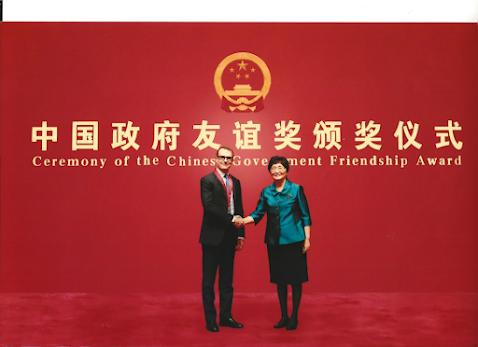Advancing Soil Health: CBCGDF Expert Prof. JIAN Jinshi Shares Insights on Soil Carbon Sequestration at "4 per 1000" Initiative
On September 21, 2023, at the invitation of the "4 per 1000" Initiative, a collaborative partner from France, Professor Jian Jinshi, an expert from the Standard Committee of the China Biodiversity Conservation and Green Development Foundation (CBCGDF), participated in the Asia-Pacific Regional Meeting of the "4 per 1000" Soil Initiative. This virtual event was held at Kanha Shanti Vanam, Hyderabad, India, and the overarching theme was "Healthy Soils for a Healthy Planet."
During his presentation, Professor Jian Jinshi, affiliated with the Institute of Soil and Water Conservation at Northwest A&F University, introduced the group standard developed by the CBCGDF Standard Committee in 2022, titled "Technical Specification for Agricultural Soil Carbon Sequestration, Part 1: One Planting Period" (T/CGDF00035-2022). He also shared insights into two related experimental cases. The following is an overview of the content presented:

Ladies and gentlemen,
Greetings to all of you!
It’s my pleasure to represent the China Biodiversity Conservation and Green Development Foundation, CBCGDF, at this conference today. I would like to share with you some of the recent efforts and activities that CBCGDF has undertaken in relation to the "4 per 1000" plan.
We have developed a Biomass Biochemical Hydrolysis Biotechnology to efficiently breakdown agricultural and forestry waste resources such as crop straw and livestock manure. The process involves the rapid breakdown of biomass, separating waste into water-soluble small molecules and solid materials such as cellulose. This technology enables us to produce a range of environmental sustainable products, including mulch film, seed blankets, and water-soluble fertilizer.
We have currently built a production facility in Wangyi District, Tongchuan City, Shaanxi Province, with an annual capacity of over 100,000 tonnes. We have also developed mobile production facilities to meet the requirements of different production scales.
To guide field experiments and assess the impact of our products on crop yield, grain quality, soil carbon sequestration, and greenhouse gas emission, we have developed the "CBCGDF Standard" and the "Agricultural Land Carbon Sequestration Assessment Operation Manual".

Under the guidance of the standard and manual, we have conducted field experiments in Tongchuan, Shaanxi Province, and Danjiangkou, Hubei Province. we applied a water-soluble fertilizer and monitored its impacts on soil organic matter, crop yield and quality. A randomized complete block design (RCBD) was involved, with 4 blocks and seven treatments, including no fertilizer, traditional chemical (NPK) fertilizer, and various levels of water-soluble fertilizer applications.
Data from the first year of the trial showed a significant increase in soil organic matter content with the application of water-soluble fertilizer, achieving a 3% increase over the no-fertilizer treatment and a 1% increase over traditional chemical fertilizer. This is inline with the "4 per 1000" target. In addition, our data showed a significant improvement in the trace elements such as copper, zinc, iron, and calcium in the grain after the application of the water-soluble fertilizer.
We have also conducted product application demonstrations and provided technical services in various regions of China, including Hubei, Jiangxi, Inner Mongolia, Heilongjiang, and Xinjiang Provinces. We are working together to establish bases for the production of straw-based products, and plans for soil improvement on more than 100,000 hectares.
In summary, over the past decades, our Foundation has been dedicated itself to the development of Biomass Biochemical Hydrolysis Biotechnology and the promotion of environmental sustainable products. We have conducted a series of field trials, product demonstrations, and technical services for carbon sequestration. That’s all, thank you.

Speaker: Jian Jinshi, CBCGDF Standard Committee
(Above picture: Professor Jian Jinshi. Image source: Provided by the speaker)
Professor Jian Jinshi is a nationally recognized young talent in China, holding a Ph.D. and serving as a professor and doctoral supervisor. His research focuses on topics such as conservation tillage, soil quality, soil erosion, soil carbon dynamics, soil respiration databases, Gross Primary Productivity (GPP), and optimizing methods for observing soil respiration. He earned his Ph.D. in Crop and Soil Environmental Sciences from Virginia Tech in 2017 and has conducted post-doctoral research at Virginia Tech and the Pacific Northwest National Laboratory. Professor Jian has received grants from the National Natural Science Foundation of China and has been involved in several U.S. Department of Energy and U.S. Department of Agriculture projects. He has published over 20 research papers, including some in prestigious journals like Nature Communications, and has received recognition for his work, including the Best Student and Young Scholar Paper Award from the Chinese Ecological Society in 2020. His contributions include establishing global-scale soil health assessment systems, developing soil respiration databases, and quantifying the role of root respiration in global soil respiration.
Original Chinese Article:https://baijiahao.baidu.com/s?id=1777716417678672889
Translator: Linda
Checked by: Daisy & JJS
Editor: Daisy
Contact: v10@cbcgdf.org; +8617319454776

Contribution
Do you know? CBCGDF is a non-profit organization. We rely on crowd-funding and donations. You have the opportunity to help us to advance biodiversity conservation. Donate TODAY to power up the movement to make it a better world for all life.
https://www.paypal.me/CBCGDFChina
http://www.cbcgdf.org/English/ConfirmDonaTion/0.html



Comments
Post a Comment